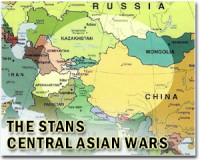| . |  |
. |
Beijing (AFP) March 8, 2011 China's traditionally Muslim Xinjiang region remains ethnically divided but is basically stable nearly two years after the eruption of deadly violence there, the region's top official said Tuesday. Zhang Chunxian also said Beijing would continue to push fast-track development of the remote but energy-rich region -- a policy that has angered many members of its roughly eight-million-strong Uighur minority. "We still need some time to restore good feelings between the ethnic groups," Zhang, who was named Xinjiang's Communist Party boss last year, told reporters on the sidelines of China's annual parliament session in Beijing. The Xinjiang capital Urumqi exploded in savage rioting, pitting Uighurs against members of China's dominant Han ethnic group, in July 2009, prompting a fierce security crackdown. Many Uighurs complain of repression by Beijing and resent what they view as an unwanted influx of Han who they say are stealing jobs and diluting their traditional Muslim culture. The government has said nearly 200 people were killed and 1,700 injured in the 2009 bloodletting. It blamed the unrest on "separatists" but has provided no evidence of any organised campaign in the region, which borders on Central Asia. Zhang also dismissed suggestions that the "Jasmine" uprisings in the Middle East and North Africa could ignite renewed unrest in Xinjiang, with its sizeable Muslim population and history of tension. "Geographically, (the Middle East) is near, but Xinjiang and these countries are completely different," he said. "Xinjiang is Xinjiang. The surrounding area is the surrounding area." However, regional governor Nur Bekri, a Uighur, said the task of maintaining stability in Xinjiang remains "grim" despite what he called an improving situation. Speaking at a Xinjiang parliamentary delegation meeting, he also denied that the region's access to the Internet was restricted. Xinjiang authorities cut off the Internet during the unrest and for 10 months afterwards, alleging it was being used by instigators to foment violence. Press freedom groups say access remains severely restricted. "The Internet is not under control," Nur Bekri said. Uighurs are a Turkic-speaking people with ethnic and cultural links to Central Asia. Energy-hungry China has ramped up development of the region -- and its oil and natural gas deposits -- in recent years. Members of Xinjiang's parliamentary delegation said regional economic growth would average 10 percent annually over the next five years.
Share This Article With Planet Earth
Related Links News From Across The Stans
 US defence chief sorry over Afghan child deaths
US defence chief sorry over Afghan child deathsKabul (AFP) March 7, 2011 US Defense Secretary Robert Gates offered a personal apology to President Hamid Karzai Monday for the deaths of nine Afghan children in a NATO air strike which drew fury in Kabul. "This breaks our heart," Gates told a news conference at the presidential palace in Kabul, as Karzai looked on. "Not only is their loss a tragedy for their families, it is a setback for our relationship with th ... read more |
|
| The content herein, unless otherwise known to be public domain, are Copyright 1995-2010 - SpaceDaily. AFP and UPI Wire Stories are copyright Agence France-Presse and United Press International. ESA Portal Reports are copyright European Space Agency. All NASA sourced material is public domain. Additional copyrights may apply in whole or part to other bona fide parties. Advertising does not imply endorsement,agreement or approval of any opinions, statements or information provided by SpaceDaily on any Web page published or hosted by SpaceDaily. Privacy Statement |